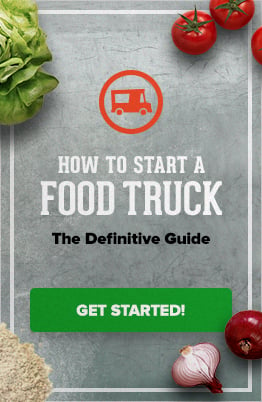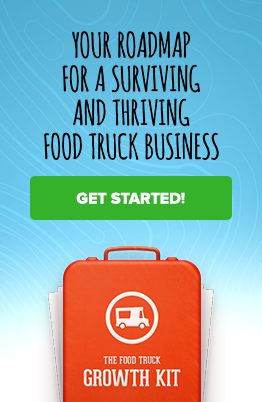In the first two units of “How to Start a Food Truck,” we worked on making some basic decisions about your food truck concept and researching the local laws and requirements for trucks in your area. With those lessons under your belt, you’re now ready to start making some real decisions about the business side of your food truck. First up on the schedule? We’re going to show you how to write a solid business plan that will serve as your roadmap to food truck fame.
Now, if you’re a long-time FoodTruckr fan, you might remember the article, “How to Write a Food Truck Business Plan,” a massive 2,600-word post we wrote several months ago. This article was one of our most popular, and with good reason—a business plan will guide you through each step of building your food truck and keep you accountable to the goals you set along the way. Your business plan is a great place to run the numbers and develop a clear picture of what it’s going to take to succeed in this tough industry, and it’s also a fantastic way to show potential investors and business partners that you’re really serious about your truck.
We firmly believe that every FoodTruckr needs a business plan, so we also created a free worksheet to accompany our original post. Though that worksheet was previously only available to members of our email list, we’re reprinting it here today so that every aspiring food truck owner can take advantage of this valuable information. Whether you’ve just started learning how to start a food truck or you’re already a pro with an established fleet of trucks, a business plan is an essential part of long-term success—and that’s why this is one of the most important lessons in the entire “How to Start a Food Truck” series.
How To Use This Lesson
As we mentioned before, the FoodTruckr article “How to Write a Food Truck Business Plan” serves as an introduction to this week’s lesson. We highly recommend reading it first and then referring back to it as a guide to understand why each of these sections matters. The U.S. Small Business Administration also has great information for entrepreneurs who are just getting started with their business plans.
Each of the following sections includes a brief summary of the information that should be included and a list of questions or items to help you begin writing. Your business plan will probably take you several weeks to complete, so don’t worry about finishing it in one sitting. When you’re finished, you should have several small essays in each section. The information you gather during this exercise will guide you in all of your future business decisions—and will also serve as a solid foundation if you decide to pursue funding or investment opportunities in the future.
Ready to get started? Let’s dig in!
1. Executive Summary
As we explained in “How to Write a Food Truck Business Plan,” the Executive Summary will appear first in the final version of your document—but you should write it last. The Executive Summary is an overview of your entire truck. It gives readers a brief introduction into what they can find in your business plan and it helps you succinctly explain what your truck is all about in no more than one to two pages. After you’ve completed Sections 2-9, return to the Executive Summary section and write a brief explanation of the following topics:
- Your experience and background
- Your food truck’s mission statement
- How your food truck fills a gap in the local market
- Your target customers
- Your products and the benefits you offer customers
- Your financial information and funding needs
- Your future goals and plans
2. Company Description
The Company Description is the section where you’ll highlight the different facets of your business—starting with your pitch and your goals. We addressed many of the questions about what your truck does and who it will serve in the first few lessons of “How to Start a Food Truck,” and we’ll talk more about goal-setting in next week’s post. Once you’re ready to complete this section, here are a few questions to answer:
- What is your truck’s name?
- When was it started?
- What do you serve?
- Does your food truck satisfy a gap in the local marketplace? How does your menu meet the community’s needs?
- What is unique about your food truck?
- Who does your food truck serve? (a specific group of customers, local businesses, events)
- What competitive advantages do you have over other food trucks? (location, value, expertise, efficiency, a unique menu)
- How will you attract customers to your truck? Note: This should be a brief description, as you’ll tackle this question in-depth when you get to Section 6.
- What kind of demand is there for your food truck? Again, answer briefly because you will address industry trends more thoroughly in Section 3.
- What are your short-term and long-term goals for your food truck?
- What type of business philosophies do you operate under?
- What is your truck’s mission statement?
3. Market Analysis
In the Market Analysis, you’ll explain your knowledge of the food truck industry and report on any research you’ve completed. Be sure to include any data or statistics you have and explain how you arrived at the answers. Consider these questions:
- How big is the food truck industry?
- What type of growth rate has the industry seen in the past year? The past 10 years?
- How is the food truck industry expected to grow over the next year? The next 10 years?
- Who do food trucks serve?
- What customers make up your target market? What characteristics do they share?
- How big is your target market? Where are they located?
- What do your customers need? Is anyone else currently meeting their needs?
- When will your customers buy from you? What challenges will you face in making sales?
- What percentage of the local market share can you reasonably expect to obtain?
- Do you expect this population to grow over time?
- What trucks will you compete against? Assess the competition by looking at each truck’s market share, advertising methods, strengths, and weaknesses.
- Are there any secondary competitors you’ll be up against? (Local restaurants, fast-food chains, convenience stores)
- How will you price items on your menu? Will you offer any discounts? Under what circumstances will you offer these discounts?
- What are the regulations and laws regarding food trucks in your city (and any nearby cities you might serve in)?
- How will local ordinances affect your ability to sell food?
- What does it take to be successful in the food truck industry?
- What is your greatest obstacle to starting and running a successful food truck—and how will you overcome it?
Are you currently doing any kind of email marketing or social media marketing? If so, then you should also be doing Facebook Messenger Marketing! Click here to find out more.
4. Organization and Management
Next up is the Organization and Management section—the place in your business plan where you’re going to explain who’s on your team and what each person’s roles and responsibilities include. Be as specific as possible while answering these questions:
- Who are the owners? What percentage of the company does each person hold?
- What is each person’s job description? What are his or her responsibilities?
- What experience does each person have? (Education, job background, unique skills, previous duties, honors and awards)
- Do any of the owners have experience in the food truck industry? How about in the restaurant, hospitality, or food service industries?
- Have any of the owners ever started a business or been involved in a startup?
- Why is each person qualified to own and operate a food truck?
- How will each person be compensated?
- Why is each person involved in this project?
- How will each person’s unique skills contribute to the food truck’s success?
- What financial assets or capital does each person have?
- Do you have an attorney or financial advisor? List their contact information here.
5. Services and Products
In the Services and Products section, you get to highlight all of the tasty goodness your food truck has to offer. Explain what you’re going to sell and why it will hit a home run with fans. And if you have ideas for the future, lay them all on the line here. Use these questions to get started:
- What does your food truck offer?
- Why will people visit your food truck?
- What advantages does your menu offer over other trucks?
- How developed are your menu and the recipes you’re planning to offer? Have you already prepared the items or are they all in the idea stage?
- Do you have any unique recipes or ideas that require copyrights, trademarks, or patents? Have you applied for these licenses yet?
- Will your truck center around a signature item or are you planning to offer an expansive menu?
- Will you offer catering or appear at events?
- Could you open additional trucks, offer franchises, or create a brick and mortar location in the future?
6. Marketing and Sales
Every successful food truck shares the same main ingredient—loyal customers. In the Marketing and Sales section, you’ll explain how you’re going to get them. First, let’s focus on the marketing aspect of that process:
- How will you break into the food truck market?
- How will you reach new customers? (Social media, local ads, press releases, location update apps, word of mouth, events, discounts, local deal programs, a website)
- How can you encourage customers to return? (Discounts, samples, loyalty programs)
- How will your food truck grow and find more customers over time?
- Will you branch out to include new items or expand to find new customers?
- How will you compete with other restaurants and fast-food chains?
- What will your marketing efforts cost?
Now, let’s think about your sales strategy. Some business owners answer these questions twice, once with their “best guesses” and once with their “worst-case scenarios.” To answer these questions, you’ll first need to calculate your necessary profit margins and develop a pricing plan for your menu—a topic we’ll explain later this month in “How to Start a Food Truck”. Once you’ve completed these estimates, consider:
- What will the average order cost at your truck?
- How many sales do you need to make per year, month, week, and day to break even? How many to turn a profit?
- What are your sales figures based on?
- How many days per year will you sell? Note: Remember to subtract days for any time you may want to take off and for days that you might lose due to inclement weather or mechanical problems with your truck.
7. Funding Request
Because many food truck owners bootstrap their businesses or work with partners to get their trucks running, the Funding Request section is optional. However, if you’re interested in finding an investor to back your truck, you’ll need to answer these questions:
- How much funding do you need to get started? Remember to include all of the costs associated with running your food truck, including: the vehicle itself, truck wrap and signs, equipment or commercial kitchen space, maintenance, fuel, insurance, licenses and permits, staff members, cooking utensils, paper products and utensils for customers, groceries, cleaning supplies, parking, office supplies, credit card processing systems, website or phone fees, legal and accounting fees, and marketing materials.
- What costs do you anticipate over the next year? The next five years?
- How did you arrive at these figures?
- How will you use any funds you receive?
- How do you intend to repay any loans you receive—or, what percentage of the profits will your investor receive in return?
- What opportunities will funding provide for your business?
8. Financial Projections
Once you’ve established sales plans and a cost analysis for your food truck, you’ll get more specific about the facts and figures in your Financial Projections section. Here’s what you need to include:
- For the first year, create monthly or quarterly projections for your total income, costs, and losses.
- After completing projections for the first year, create a quarterly or annual estimate for the next four years.
- If you’re seeking funding and you already have a business, you may need to include financial data for the past several years related to your company’s income, cash flow, and costs—as well as records explaining your assets and existing loans.
Note: For most entrepreneurs, this section involves a lot of guesswork. That’s okay as long as you clearly indicate where you’re making assumptions and how you’re arriving at your figures. Be sure that any numbers included in your funding request clearly match up with the projections and expectations you’ve outlined in other sections, as investors will carefully examine your document for inconsistencies.
9. Appendix
Some business owners also create appendices with important documents to supplement their business plans. Though an appendix is not required, it is a good way to present your most important records to potential investors and to collect the information for yourself.
Your appendix might include:
- A copy of your personal or business credit history
- Pictures, recipes, or prototypes for products and menu items
- Resumes for your owners or team managers
- Reference letters
- Licenses, permits, and certifications
- Patents, trademarks, or copyright information
- Market analysis documents
- Leasing information
- Your truck’s maintenance and ownership records
- Contracts
- Contact information for your business consultants or legal advisors
Finalizing Your Business Plan
We’ve tackled a lot of sizable topics throughout the “How to Start a Food Truck” series, but writing a business plan is undoubtedly one of the biggest. Writing a business plan will take some time, and you’ll probably need to think about a lot of areas of your food truck business that hadn’t even occurred to you yet. That’s okay—you don’t need to have all the answers right now. You’ll benefit simply from beginning to compile this information and from thinking about these questions in the space of a single document.
Once you’ve finished writing about the key facets of each area of your business, you can start editing and revising the document to present a clear, comprehensive outline of your food truck’s needs, goals, and assets. If you’re presenting your business plan to an investor, keep in mind that spelling, punctuation, and your writing style matter immensely. Investors will judge your business plan by the information you include and by the way you share it.
Still have questions about what your business plan should include or where to find the answers? Remember that FoodTruckr is here to help! Any time you have a question about your business plan or you need to know something about the food truck industry, contact us on Facebook, Twitter, or via email. We’re always happy to help you track down the best business advice and strategies you need to make your food truck dream a reality!
Coming up next week: We talk goal-setting and the best ways to plan out your dreams. Stay tuned for this important lesson in starting a food truck business!
Want to learn how to build a subscriber list for your food truck business? One of our managing partners here at FoodTruckr has put together an AMAZING FREE GUIDE that will teach you everything you need to know about getting started with Messenger Marketing! Click here to get your free guide.
image by Elin Schönfelder
There is no ads to display, Please add some


